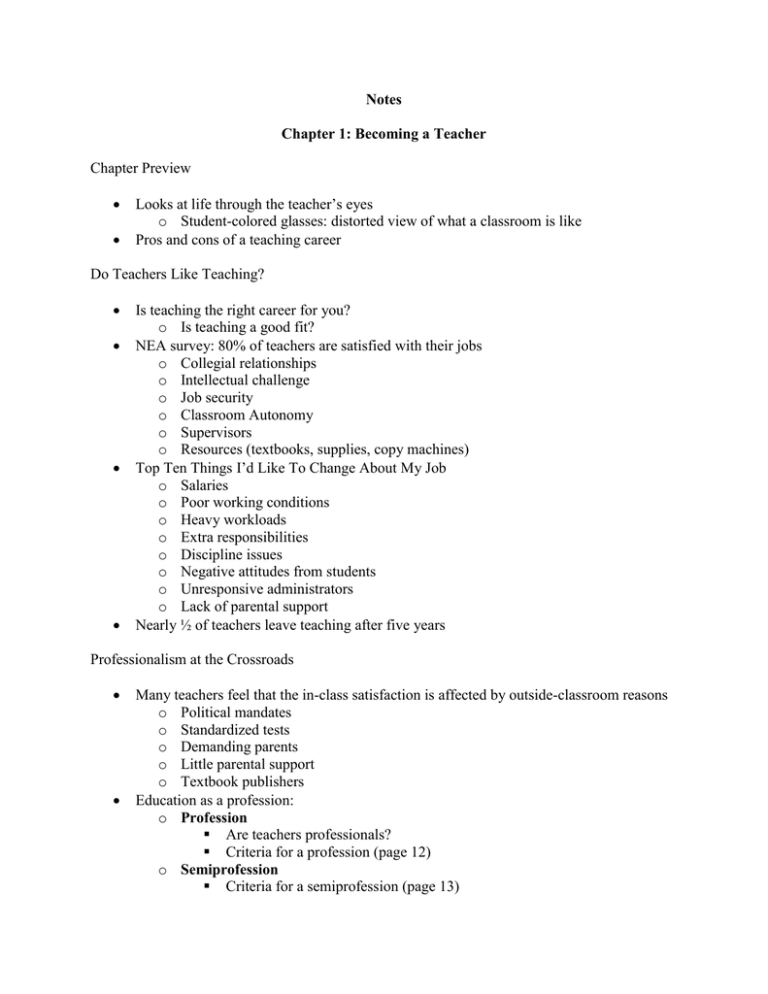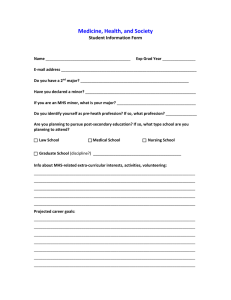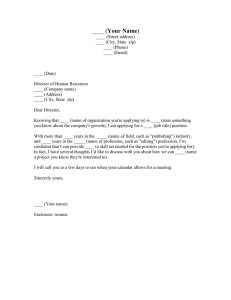Ch 1 Notes.doc
advertisement

Notes Chapter 1: Becoming a Teacher Chapter Preview Looks at life through the teacher’s eyes o Student-colored glasses: distorted view of what a classroom is like Pros and cons of a teaching career Do Teachers Like Teaching? Is teaching the right career for you? o Is teaching a good fit? NEA survey: 80% of teachers are satisfied with their jobs o Collegial relationships o Intellectual challenge o Job security o Classroom Autonomy o Supervisors o Resources (textbooks, supplies, copy machines) Top Ten Things I’d Like To Change About My Job o Salaries o Poor working conditions o Heavy workloads o Extra responsibilities o Discipline issues o Negative attitudes from students o Unresponsive administrators o Lack of parental support Nearly ½ of teachers leave teaching after five years Professionalism at the Crossroads Many teachers feel that the in-class satisfaction is affected by outside-classroom reasons o Political mandates o Standardized tests o Demanding parents o Little parental support o Textbook publishers Education as a profession: o Profession Are teachers professionals? Criteria for a profession (page 12) o Semiprofession Criteria for a semiprofession (page 13) Does it describe teaching? o Teaching is a career with potential and frustration From Normal Schools to Board-Certified Teachers History of teacher preparation From colonial America to the 20th century, teacher education scarcely existed o Apprenticeship o Indentured servitude o “Sink or Swim” o Secondary teachers received some college education in their subject area Teaching skills were not necessary Teaching was temporary employment not a career o Normal School Education Rev. Samuel Hall started a private normal school in 1823 in Concord, VT Provided formal teacher training Horace Mann-first state-supported normal school in Lexington, MA Provided two year teacher training Academic subjects and teaching methodology o Teachers received less than professional treatment o Teaching became a female oriented profession and held in low regard As enrollment in school increased, so did the need for better trained teachers o As teacher college attendance grew, state colleges began o Colleges expanded their programs and began offering courses and career preparation 1980s: Beginning of reshaping current education o Tomorrow’s Teachers and A Nation Prepared o Called for higher standards and increased professionalism in teachers National Board for Professional Teaching Standards (NBPTS) o Recognizes extraordinary teachers with high levels of achievements o Identify board certified teachers: advanced recognition of a higher level of skills and competencies Assessments, interviews, portfolios, pricey fees Stipends and higher pay scales Release time to work with new teachers Only 2% of teachers are board certified. Working? Failed attempt? How Teachers Are Prepared Today There is no consensus on how to best prepare teachers Education Preparation o Traditional: Preservice program in which students study teaching and subject matter and practicum B.A. and M.A. Obtain a state teaching license Graduate 5 times more students o Alternative: On-the-job training Seek licensure through apprenticeship Assumption of subject matter knowledge Training and support is unconventional and controversial Fast-Track Teach for American, Teach ---- (NY) Work in distressed environments o Tough classrooms o Impoverished neighborhoods “Height of irresponsibility” ???? Accompanying master’s degree teaching training Views of Teacher Education What is your ideal teacher preparation program? Education professors want to prepare teachers: o Who are lifelong learners and constantly updating their skills o Committed to teaching children to be active learners o Who have high expectations of all their students o Who are deeply knowledgeable about subject content they will teach What do first year teachers consider most beneficial from their teacher training? o Lesson planning preparation o Use of instructional methods o Classroom management techniques o Student assessment Urban Legends about Teaching “Teachers are born, not made.” o Training and practice are needed to make a gifted teacher “All you really need to know is the subject you are teaching.” o Knowledge of pedagogy is necessary Outperform teachers that only possess subject matter knowledge “Teacher education students are less talented than other college majors.” o Teacher programs are stronger today than ever before o Public holds high expectations o Must pass national competency exams Teacher education programs o Emphasize current research as well as practical classroom skills o Work closely with local schools o Increased professional status o Teacher influence over policies, procedures, schedules and curriculum Southwest Airlines and Teaching Southwest Airlines: egalitarian corporate culture Employee happiness creates customer happiness o What traits are needed for successful teaching? o Passion for job We Like Questions The field of education is full of: o Controversy o Misperceptions o Surprises o Constant changes Q: What steps can I take between now and graduation to make myself an attractive teaching candidate? A: Become informed about the job market Select appropriate courses and extra-curricular activities Special education/Bilingual education Race/Gender needs Education journals Job fairs, job sites A: Make sure your coursework in planned carefully. Enroll in necessary classes o Certification and Licensure Develop a “unique, competent and relevant academic background” (27) A: Do not underestimate the importance of extracurricular activities. Career-related jobs o Show interest and experience working with children Volunteer opportunities parallel future job choices A: Begin networking. Network for information about employment opportunities o Teachers, administrators, school personnel Let them know what jobs you are looking for and your skills and experiences that qualify you for those jobs o Don’t become a nuisance! A: Begin collecting recommendations now. Rec. letters greatly influence employment decisions Don’t wait to begin collecting them! Places to get them: o Extra-curricular activities, coursework, part-time employment, volunteer work Ask for these letters before leaving o People move, retire or even forget you! o Draft key points A: Develop a resume and portfolio. Resume: Central to being considered for a position Portfolios: Comprehensive reflection of a candidate’s skills A: Make good first, second, third and fourth impressions. Participation in school activities o Classroom observations, teacher’s aide, student teacher o Observation handbook Good impressions-job offers Visits to schools are informal job offers Known people are preferred unknown people

